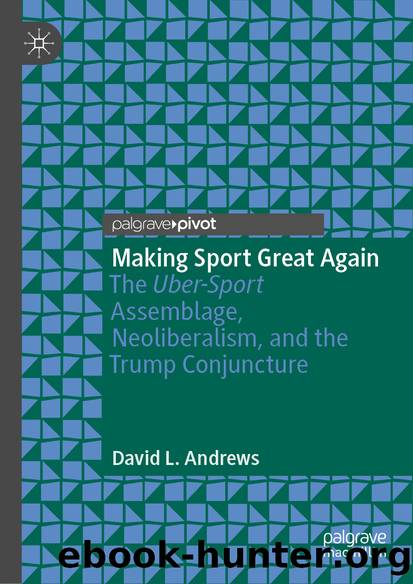Making Sport Great Again by David L. Andrews

Author:David L. Andrews
Language: eng
Format: epub
ISBN: 9783030150020
Publisher: Springer International Publishing
Consuming Spaces and Subjects
The rhizomatic spread of the neoliberal assemblage has wrought profound changes on the spaces, and allied subjectivities, framing and informing existence within the contemporary US. Importantly for the focus of this discussion, the corporatized commercialization of virtually all aspects of everyday life has resulted in the emergence of a new mode of public commons prevalent within the consumerist landscape of late capitalismâs entrepreneurial cities (Harvey, 1989). In a Deweyan sense, the commons represent a space (which can be physical or cultural resources) through which publics are afforded the opportunity to secure, and indeed advance, the public good through various forms of collective engagement, involvement, and/or participatory citizenship (Antonio, 2013). Once replete with freely accessible public commons (i.e., âstreets, plazas, and parksâ¦places where proximity breeds interaction among city inhabitantsâ [Foster & Iaione, 2016, p. 297]), increasingly expansive swathes of contemporary cities are punctuated by privately owned public spaces (POPS), which include: âshopping malls, themed restaurants and bars, entertainment-oriented museum and gallery installations, gentrified housing developments, conference complexes, waterfront pleasure places, and professional sport mega-complexes â (Silk & Andrews, 2008, p. 396). Designed less as shared spaces of human exchange, and more as sites of capital exchange effectuated through various forms of consumption, cities are now oftentimes economically dominated and culturally defined by these heavily commercialized, sanitized, and securitized quasi-public enclosures. The neoliberal reformation of the city as an assemblage of/for consumption (Miles, 2010), has thus contributed to a loss, or âsavagingâ of the commons by the forces of corporate and commercial privatization (Antonio, 2013).
Compelled by normalized neoliberal urban development strategies, governing elites (most often partnerships between local government and corporate interests) âcommodify the city,â and so âcreate the conditions in which the city becomes an exciting place to live and visit and, above all, in which to consume â (Miles, 2012, p. 218). As a coalescence of multi-scaled and multi-sited network of assemblage associations (DeLanda, 2006), the neoliberal city thus provides the setting for responsibilitized neoliberal citizen-consumers to pursue their projects of entrepreneurial selfhood. Moreover, predicated on the production of consumption, the material-expressive-affective assemblage of the neoliberal city reinscribes the centrality of consumption, and that of the consumer, within the broader neoliberal assemblage : the consuming subject emerging and existing relationally, as a territorialized effect of its articulation to, and through, the multiple and heterogenous consumption spaces comprising the post-industrial cityscape. The discussion now turns to an examination of how different scales and spaces of the uber-sport assemblage âspecifically, urban development logics, built environments, and commercialized spacesâserve as stealthy agents reinscribing the centrality, and positive popular affective investment in, consumption and the consumer subject , within the broader neoliberal assemblage .
A material example of the suturing, or stitching together, of uber-sport and neoliberal assemblages can be discerned from the logics driving the building of professional sport facilities , particularly those located in deindustrialized urban settings long recognized as prime zones for redevelopment (Chapin, 2004; Schimmel, 2001). The complex relationship between uber-sportâs organizational avarice, and what had become hegemonic
Download
This site does not store any files on its server. We only index and link to content provided by other sites. Please contact the content providers to delete copyright contents if any and email us, we'll remove relevant links or contents immediately.
Time Management Made Easy: How to Cultivate New Habits, Improve Productivity and Get Things Done by Joshua Strachan(2419)
The 7 Habits of Highly Effective People by Stephen R. Covey & Sean Covey(2269)
The Concise Laws of Human Nature by Robert Greene(1917)
Doesn't Hurt to Ask by Trey Gowdy(1640)
Primal Leadership by Daniel Goleman(1286)
Hook Point: How to Stand Out in a 3-Second World by Brendan Kane(1250)
Don't Sweat the Small Stuff...and It's All Small Stuff by Richard Carlson(1123)
The Power of 100! by Shaun King(1100)
HBR's 10 Must Reads 2021 by unknow(1099)
Amazon Unbound by Brad Stone(1047)
100 Things Successful People Do by Nigel Cumberland(1031)
Master of One by Jordan Raynor(1008)
HBR's 10 Must Reads 2021 by Harvard Business Review(1008)
The Job Closer by Steve Dalton(995)
Lives of the Stoics by Ryan Holiday & Stephen Hanselman(970)
Declutter Your Mind: A step by step guide to learn to control your thoughts, stop worrying, relieve anxiety and eliminate panic attacks and negative thinking by Mia Chandler(970)
Conflicted by Ian Leslie(873)
The Book of Hope by Jane Goodall(872)
Coders at Work: Reflections on the craft of programming by Peter Seibel(848)
